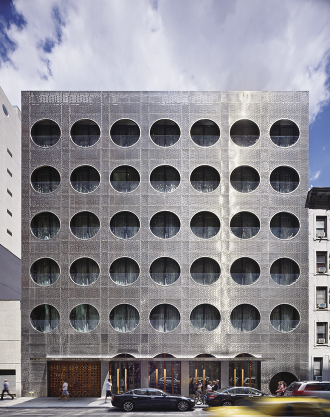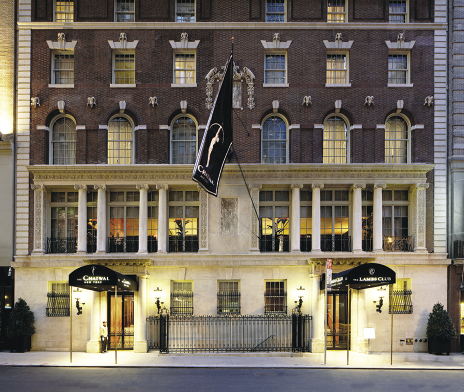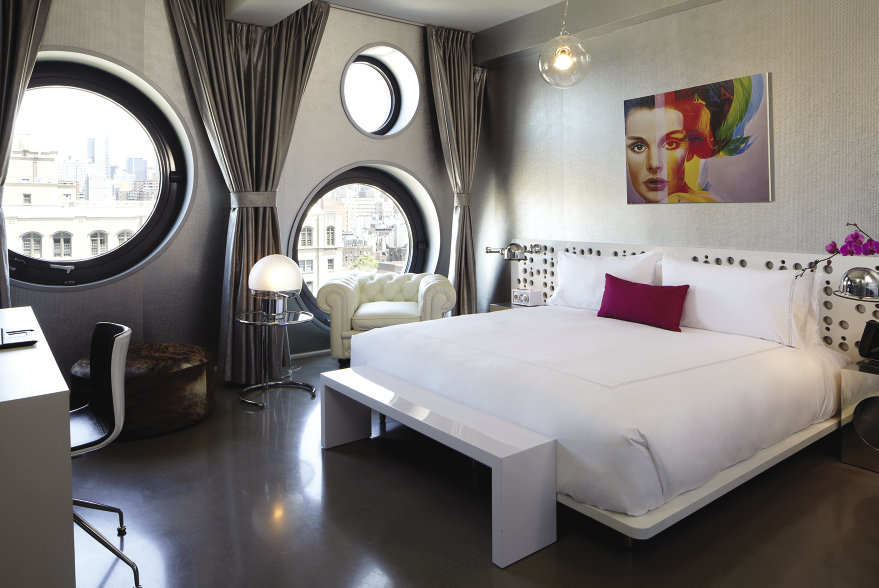- Home
- Media Kit
- Current Issue
- Past Issues
- Ad Specs-Submission
- Ad Print Settings
- Reprints (PDF)
- Photo Specifications (PDF)
- Contact Us

![]()
ONLINE

Value Creation
Editors’ Note
Eric Danziger joined Hampshire Hotels Management, LLC in April 2014. A lodging industry veteran, he previously held the position of President at Wyndham Hotel Group, having joined the company in late 2008 after serving in executive leadership roles for some of the world’s most well-known hospitality companies. Included among these are Carlson Hotels Worldwide, Starwood Hotels and Resorts Worldwide, Double Tree Hotels, and the former Wyndham International. Before his tenure at Wyndham Hotel Group, Danziger was Chief Executive Officer of WhiteFence. Prior to this, he served as President and Chief Executive Officer of ZipRealty®. From 1998 to 2001, Danziger was President and Chief Operating Officer of Carlson Hotels Worldwide. From 1995 to 1998, he served as President and Chief Executive Officer of Starwood Hotels and Resorts Worldwide. Daniziger began his career as a bellman at San Francisco’s historic Fairmont Hotel. He holds an honorary doctorate from Johnson & Wales University in Providence, R.I., where he is a distinguished visiting professor.
Company Brief
Comprising 11 hotels across North America, Bangkok, and Cochin, Hampshire Hotels Management, LLC (hampshirehotels.com) is a leader in luxury and boutique hotel collections worldwide. After working with many leading three- and four-star hotel brands, they opened their first independent four-star boutique hotel in New York in 1999: The Time, a celebrated property centrally located on 49th Street and Broadway. In the fall of 2004, a new concept hotel, Dream, also opened in New York. The second Dream opened in Bangkok in 2006, followed by further expansion into Cochin, India as well as Miami, Florida and a flagship property in New York’s Meatpacking District. Additional properties are currently underway globally. In September 2010, Hampshire Hotels Management, LLC unveiled its first five-star luxury product, The Chatwal New York.
When this opportunity presented itself to you, what made you feel it would be the right fit?
What I love most is to build things, and every company I’ve worked for was focused on taking an idea, creating and executing a strategy, and bringing great people in to get the job done. There is usually a harvesting of value for all of the stakeholders once that’s accomplished.
With Hampshire, I saw that I could do all of that. I was tired of spending most of my time on the road. Hampshire has some great hotels, though I immediately recognized that the genesis of the company was to buy and sell property, Sant Chatwal wanted desperately to make something of his vision and his creation, and knew he needed different skills in the company to do that. I so very respect and admire what he built and his desire to take it to another level.
I saw the opportunity to create nice value for everybody, through taking this series of fabulous hotels that were just a collection and heading up what is essentially an 11-hotel start-up company.

Dream Meatpacking
Is the Hampshire Hotels brand important for awareness purposes or are you focused on building awareness of the specific hotel brands?
It is infinitely more important that the hotel brands be a value to both owner and consumer. The Hampshire Hotels brand is a name for which it is only important that the ownership groups understand the message that these hotels are all part of this family, and that they all get the same unique talent and execution.
I don’t expect to market the Hampshire name to the consumer but the owner will have the greater exposure.
Would you touch on all of your brands and the growth potential for each?
We’re going to launch a new five-star luxury brand. We currently have the Chatwal, which is a five-star luxury product, and we do a really great job at that, though I don’t see the name as being exportable. We will be announcing a new name soon.
The next is Dream, which is an upper-upscale lifestyle brand that is a place where people want to be seen at a scene. We do $20-million a year at the rooftop bar, PH-D at Dream Downtown. It’s hugely successful, and we have many similar concepts in the pipeline.
We also have a great hotel called The Time, which is being completely redone by David Rockwell. That brand will be the upper-upscale lifestyle brand that is more refined – it may have a great restaurant and bar but it’s not five outlets with people running all over the place.
We’re going to announce an additional brand in the three-star full-service space. We were wondering why someone in that space wasn’t offering a lifestyle product that is non-homogenous and unique for the consumer. In addition we have Night, which has a new logo. It’s going to be the same as the three-star in its limited or select service base.
The unique and fun lifestyle product is applicable to any traveler because there is a philosophical difference: Many hotel companies spend a lot of time talking about making you feel at home, but I have the complete opposite view. I don’t think you want to feel like you’re at home – you should feel this was a hard trip and you hate to be away from your family, but at least you get to stay at a nice place.
This unique experience is at the core of the five different brands within the managed group.

The Chatwal New York
Is it tough to get the message out that you can offer a more affordable product and great service?
I’ve never referred to ours as the hotel business – it’s the hospitality business. When you go into Dream Downtown, you are met with friendly and hospitable people who work very hard to provide the service behind the name.
Service in my mind is twofold. The two most important positions in a hotel are the housekeeper and the front desk. Every customer, no matter what the experience, will remember if the hotel was clean and if he received friendly service.
Technology is important as an enabler, but I checked people in as a young hotel worker without technology, and I believe it has gone too far. You’re missing something when you have a phone that lets you bypass everything and go to your room, even if it is faster. Great luxury service is about connecting with the customer and remembering their preferences.
How will you maintain growth at all properties?
We will not hire senior leadership from the outside – they will be groomed from within, because the culture of the heart cannot be taught. It has to be experienced firsthand.
One way to perpetuate growth is to forecast then strengthen your plan regularly. This is vital because it helps people become clear on the opportunities they have with the company.
One of the pluses of being in a small company is that I can affect change and get things done. When we’re at 300 properties, it will be harder.
But it’s all about investing in the right systems and people so that the enabling attributes are executed by people who get it.
This is a business that is executed at the hotel, not at a corporate office.
This is also an industry that is highly desirable to work in and one where people have great opportunities and great fun, and reap financial rewards.
It’s all about the training and the quality of people. With Dream Downtown, we have five layers of management, which is way above what that hotel could afford alone, but we’re investing in them so they can grow and learn, and then move on to our other properties as they come online.
Will the growth be in the U.S. or are you looking globally?
A couple of opportunities may occur internationally but it’s not the key focus. I hired five vice presidents of development and they’re all based in North America.
We will do some things around the world, but currently, the model is not focused on franchising – it’s about us running everything firsthand.
We may, however, franchise some of the brands globally because if we have partners who are hotel people and they know what they’re doing; it could potentially be executed better abroad.
For now the focus is on growing these five brands domestically. We are looking at an opportunity for Dream in London and one in Dubai, but I’m not working on anything full-scale yet.

A guestroom at the Dream Meatpacking
How have your brands been so successful in the food and beverage area, which is typically quite challenging?
It’s tough. This is where the hotel guy has to put his ego in check and determine who is best at doing this in a given spot. There will be hotels where we manage all the food and beverage because it doesn’t need an important chef involved.
But in a market like New York, we have partnered with Iron Chef Geoffrey Zakarian at The Lambs Club, who does a fabulous job. We have also partnered with The Tao Strategic Group at Dream Downtown. We look at every individual deal, ego aside, and determine what will make the hotel the most successful.
Do you need to offer the full spa experience in the luxury space today?
This is a site-specific choice. Generally, the answer is yes because a customer paying $600 per night expects it.
I have a very unique attitude towards hotels. I’m an anti-brand standards guy because a brand is built on the back of an owner to accomplish awareness but there is no real return for a specific hotel.
The essence of the Doubletree cookie is to tuck you in at night, but that standard would not be applicable around the world. For instance, they might bring a Doubletree to a market where nobody likes cookies but would prefer challah bread.
Brands should not impose a standard. They should look at a hotel and carefully define the essences of the brand, which are then communicated and promised to customers.
If we create a Dream in a market that is 100 percent male and there was an average 1.1 night stay, they might not want a spa – that hotel might want a free car service to the airport instead.
A hotel should provide the level of service that a guest in that category wants, but then customize it to the market’s needs.

The pool at Dream Meatpacking
How do you offer the technology without losing the personal touch?
You have to be a participant in progressive technology, particularly with today’s social media market. The smart phone did not exist eight years ago and now it rules everything.
The hotel industry has always been slow to respond to consumers. The requirements for a laptop and mobile phone are Wi-Fi on the one hand, but the most frustrating thing for people until recently has been where to plug something in to charge their devices. It took the industry about four years to design a product that was accommodating to the consumers’ needs.
It’s about being alert to these needs and responding more quickly.
Did your people quickly embrace the changes you were implementing?
Most people were indeed happy to see a new level of structure and process. All of the people here wanted as desperately as Sant did to create a bigger company with more opportunities. I kept everyone here as I felt that what I needed to do was mix into the existing blood, which would give us a new and healthier “body.” In a nut shell, the content of peoples’ hearts is what matters in making a team. Skill sets can be complimented.
Before joining Hampshire, there was a very different expectation – a wonderful real estate developer had bought some fantastic hotels. I can’t do what he did. That said, there wasn’t a clearly defined policy in the company. There wasn’t a clear understanding of the mission, vision, and values, nor an understanding of what we are here for and how we do it.
Most of the staff made a point on a one-on-one basis of saying they were happy to see me and excited for the growth potential within the company. I have been pleased with the receptivity of everyone involved.
This is the big leagues and our success is defined by the strength of our players.
I’m firm and demanding, but my goal is to see everyone reach their highest potential.•